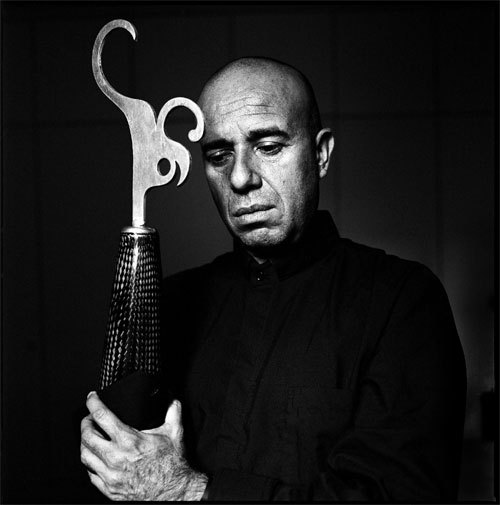
An Interview with Writer Mario Bellatin
The Mexican writer Mario Bellatin’s latest book to appear in English is The Large Glass, published by Phoneme Media. The novel presents itself as an autobiography, and in doing so scrambles the very idea of autobiographical writing, suggesting that the truth about our lives isn’t in the telling of facts, but in their transmutation. The book also allows Bellatin to continue to play with his mercurial public persona. He is well known in the Spanish-speaking world for his thirty-plus books, as well as for the flamboyant prosthetic limbs he used to wear at events in place of the forearm that he is missing.
The Large Glass offers no straightforward insights into its creator, which is the point. It is broken into three parts, each with a Beckettian feel of perfectly off-key humor and strangely dislocated narrators: a boy whose mother charges customers at a bathhouse to behold her son’s transcendent testicles; a Sufi writer who has an odd encounter with his sheika; and a woman-child whose family was kicked out of their home and now can’t stop lying about who she is. The secret of the novel seems to exist in the spaces between the three stories, and between them and Bellatin.
Mario and I emailed about his new book over the course of the past few months.
—Aaron Shulman
THE BELIEVER: Labeling The Large Glass feels slippery. It could be called an autobiography cloaked by fiction, an autobiographical fiction, or a work that lives on the smudgy threshold between reality and imagination. How would you describe it?
MARIO BELLATIN: I think it’s an autobiography down to its smallest details. Moreover, I think this is how all autobiographies should be. The traditional approach, as it is framed, almost always produces fiction that betrays the truth as a function of the classic format. If I had the time and the desire to do such an exercise, I could rewrite the book in a strictly realistic sense. But it would lose a good part of what a book needs to be for me to see myself honestly.
BLVR: Do you think that there is a brutal honesty embedded in lies? After all, fiction at its core is the art of lying and making things up.
MB: More than lies I think of impostures. And, of course, only a fool would waste the opportunity to express what can’t be said in other spheres when they have created a space to do so. I don’t believe in the art of lying—that wouldn’t go further than Pinocchio or the Boy Who Cried Wolf—but rather in an Art of Wielding False Innocence.
...
You have reached your article limit
Sign up for a digital subscription and continue reading all new issues, plus our entire archives, for just $1.50/month.
Already a subscriber? Sign in




